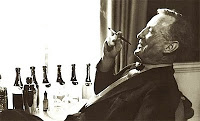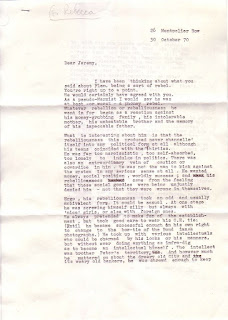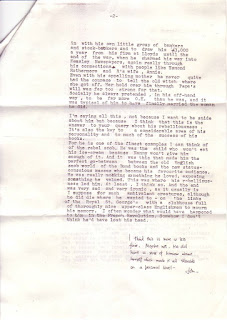Found in a copy of John Pearson's book and addressed to someone called Jeremy. Dated 30/10/70 from Knightsbridge. Pearson was a friend of Fleming and had been his assistant at the Sunday Times. The tone is friendly and urbane but very frank; it is important to record that John Pearson adds this postscript 'He did have a great sense of humour about himself which made it all tolerable...''

I have been thinking about what you said about Flem[ing] being sort of a rebel. You're right up to a point. He would certainly have agreed with you...As a pseudo-Marxist I would say he was at best -or worst - a phoney rebel. Whatever rebellion or rebelliousness he went in for began as a reaction against his money-grubbing family , his intolerable mother, his unbeatable brother and the memory of his impeccable father.
What is interesting about him is that the rebelliousness this produced never channelled into any political form at all although his teens coincided with the 1930s...He was far too narcissistic , too self-absorbed,too lonely to indulge in politics. There was also an extraordinary vein of caution or cowardice in him. He was not the man to kick against the system in any serious sense at all. He wanted money , social position , worldly success ; and his rebelliousness came from the feeling that these social goodies were being unjustly denied him - not that they were wrong in themselves.
Ergo, his rebelliousness took an odd and usually ambivalent form. It could be sexual. At one stage he was screwing himself silly but always with 'nice' girls, or else with foreign ones. He always pretended to make fun of the establishment , but took good care to wear his O.E. tie. (Until he became successful enough in his own right to change to the bow-tie of the Bond image photographs.)
He took up with various intellectuals who could be charmed by his looks and by his manners, but without ever doing anything as infra-dig as to become an intellectual himself. The intellect was brother Peter's territory. And however much he muttered on about the dreary old City and its weary old bankers, he was shrewd enough to keep in with his own little group of bankers and stock-brokers and to draw his ₤3,000 a year from his firm at Lloyds until the end of the war, when he charmed his way into Kemsley Newspapers again really through his connections with people like Esmond Rothermere and R's wife Annie.
Even with his appalling mother he never quite had the courage to tell the old witch where she got off. Her hold over him through Papa's will was far to strong for that. Socially he always pretended, in his off-hand way, to be far more O.K. than he was, and it was typical of him to have finally married the woman he did.
I'm saying all this,not because I want to be snide about him but because I think that this is the answer to your query about his rebelliousness.It's also the key to a considerable area of his personality and to much of the success of his books.
For he is one of the finest examples ...of the rebel snob. He was the child who won't eat his ice-cream because Nanny won't give him enough of it. And it was this that made him the perfect go-between between the old English snob world of the Bond books and the new status-conscious masses who became his favourite audience. He was really mocking something he loved, exposing something he valued. This was where his rebelliousness led him. At least I think so. ...the end was very sad and very ironic , as it usually is ...for such ambivalent creatures, although he did die where he wanted to [at a golf club] the Royal St. George's with a clubhouse full of thoroughly nice upper-class Englishmen to mourn his memory. I often wonder what would have happened to him in the French Revolution. Somehow I don't think he'd have lost his head.
[Handwritten],I think this is more or less fair. Maybe not.He did have a sense of humour about himself which made it all tolerable on a personal level -. John.'


